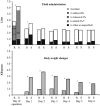Effects of intravenous fluid restriction on postoperative complications: comparison of two perioperative fluid regimens: a randomized assessor-blinded multicenter trial
- PMID: 14578723
- PMCID: PMC1356139
- DOI: 10.1097/01.sla.0000094387.50865.23
Effects of intravenous fluid restriction on postoperative complications: comparison of two perioperative fluid regimens: a randomized assessor-blinded multicenter trial
Abstract
Objective: To investigate the effect of a restricted intravenous fluid regimen versus a standard regimen on complications after colorectal resection.
Summary background data: Current fluid administration in major surgery causes a weight increase of 3-6 kg. Complications after colorectal surgery are reported in up to 68% of patients. Associations between postoperative weight gain and poor survival as well as fluid overload and complications have been shown.
Methods: We did a randomized observer-blinded multicenter trial. After informed consent was obtained, 172 patients were allocated to either a restricted or a standard intraoperative and postoperative intravenous fluid regimen. The restricted regimen aimed at maintaining preoperative body weight; the standard regimen resembled everyday practice. The primary outcome measures were complications; the secondary measures were death and adverse effects.
Results: The restricted intravenous fluid regimen significantly reduced postoperative complications both by intention-to-treat (33% versus 51%, P = 0.013) and per-protocol (30% versus 56%, P = 0.003) analyses. The numbers of both cardiopulmonary (7% versus 24%, P = 0.007) and tissue-healing complications (16% versus 31%, P = 0.04) were significantly reduced. No patients died in the restricted group compared with 4 deaths in the standard group (0% versus 4.7%, P = 0.12). No harmful adverse effects were observed.
Conclusion: The restricted perioperative intravenous fluid regimen aiming at unchanged body weight reduces complications after elective colorectal resection.
Figures


Comment in
-
Evidence for conservative fluid administration following elective surgery.Ann Surg. 2003 Nov;238(5):649-50. doi: 10.1097/01.sla.0000094389.57819.82. Ann Surg. 2003. PMID: 14578724 Free PMC article. No abstract available.
-
Are actual standard fluid regimens in major surgery safe?Ann Surg. 2004 Aug;240(2):384-5; author reply 385-6. doi: 10.1097/01.sla.0000134634.38262.d9. Ann Surg. 2004. PMID: 15273565 Free PMC article. No abstract available.
-
Effects of intravenous fluid restriction on postoperative complications: comparison of two perioperative fluid regimens: a randomized assessor-blinded multicenter trial.Ann Surg. 2004 Aug;240(2):386; author reply 386-8. doi: 10.1097/01.sla.0000134633.10987.87. Ann Surg. 2004. PMID: 15273568 Free PMC article. Clinical Trial. No abstract available.
-
Effects of intravenous fluid restriction on postoperative complications: comparison of two perioperative fluid regimens.Ann Surg. 2005 Jan;241(1):194. doi: 10.1097/01.sla.0000149933.22895.96. Ann Surg. 2005. PMID: 15622009 Free PMC article. No abstract available.
-
Fluid overload and surgical outcome: another piece in the jigsaw.Ann Surg. 2009 Feb;249(2):186-8. doi: 10.1097/SLA.0b013e318197bdfc. Ann Surg. 2009. PMID: 19212168 No abstract available.
References
-
- Bennett J, McDonald T, Lieblich S, Piecuch J. Perioperative rehydration in ambulatory anesthesia for dentoalveolar surgery. Oral Surg Oral Med Oral Pathol. 1999;88:279-284. - PubMed
-
- Cook R, Anderson S, Riseborough M, Blogg CE. Intravenous fluid load and recovery. A double-blind comparison in gynaecological patients who had day-case laparoscopy. Anaesthesia. 1990;45:826-830. - PubMed
-
- Keane PW, Murray PF. Intravenous fluids in minor surgery. Their effect on recovery from anaesthesia. Anaesthesia. 1986;41:635-637. - PubMed
-
- Spencer EM. Intravenous fluids in minor gynaecological surgery. Their effect on postoperative morbidity. Anaesthesia. 1988;43:1050-1051. - PubMed
-
- Yogendran S, Asokumar B, Cheng DC, et al. A prospective randomized double-blinded study of the effect of intravenous fluid therapy on adverse outcomes on outpatient surgery. Anesth Analg. 1995;80:682-686. - PubMed
Publication types
MeSH terms
Substances
Grants and funding
LinkOut - more resources
Full Text Sources
Other Literature Sources
Medical

